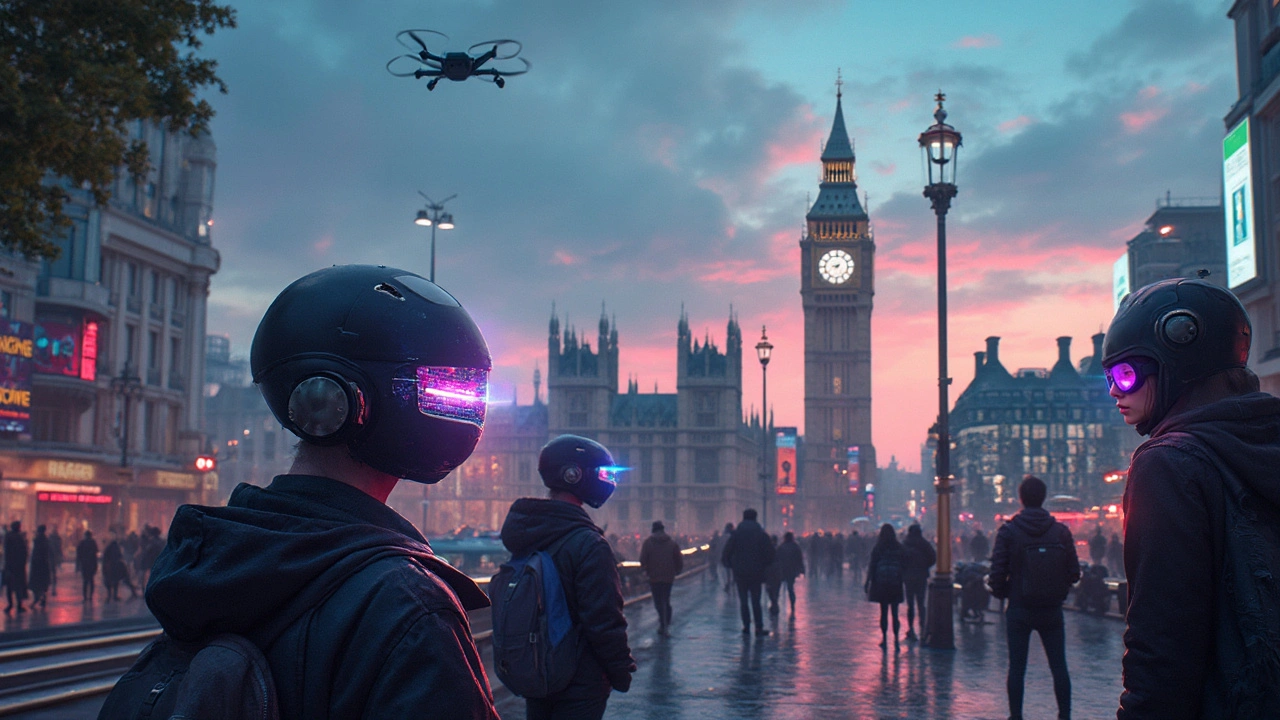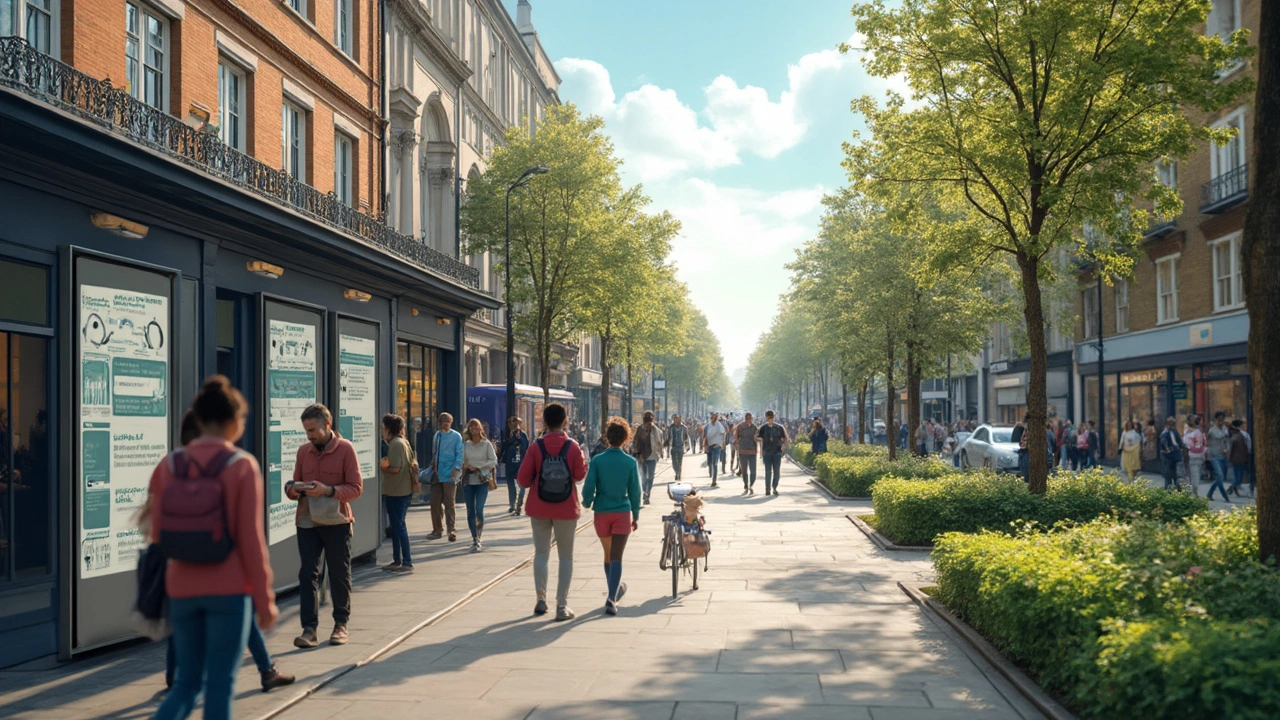
So, what are the current travel restrictions concerning COVID-19 in London in 2025? If you’re planning a trip to London, staying up-to-date with entry requirements, testing mandates, and quarantine rules is a must. These change depending on where you're coming from, which might get a bit confusing.
The UK government is closely following global health standards to keep the public safe. This means frequent updates, so regularly checking official resources before you pack your bags could save some hassle.
Pros
- Protects public health
- Aligns with global standards
- Uses latest government travel advisories
Cons
- May cause logistical burdens
- Requirements vary by origin country
- Rapidly changing policies
Traveling can be fun, but a pandemic can make it complicated. Knowing the rules not only helps you but also supports the broader effort of keeping everyone safe.
- What travel restrictions apply regarding COVID-19 in London?
- Alternative Sources of Local COVID-19 Data
- Understanding London's Public Health Guidelines
- COVID-19 Impact on Public Transportation
- COVID-19 Vaccination Programs
- Event Restrictions in London
- Impact on London's Education System
- Economic Impact of COVID-19
- Advice for Tourists Visiting London
What Travel Restrictions Apply Regarding COVID-19 in London?
Planning a visit to London in 2025? Staying informed about current travel restrictions is essential to ensure a smooth journey. The rules can shift rapidly as global health situations evolve, so it's worth double-checking even close to your departure date.
Currently, all travelers need to be aware of entry requirements, which might vary based on your country of origin. The UK government has set up a tiered system, adjusting restrictions based on the pandemic status in different regions worldwide. This system aims to protect public health while aligning with global standards.
Testing and Quarantine Requirements
For international travelers, COVID testing before arrival may be necessary. In some cases, additional tests upon arrival in London are mandated. While this might seem a bit of a hassle, these measures are in place to catch any potential cases early, acting as a safeguard for everyone.
Depending on where you're coming from, you might face quarantine rules. As of now, travelers from high-risk zones are usually required to self-isolate for a predetermined period unless they meet specific criteria.
Vaccine Passport and Proof of Vaccination
A COVID-19 vaccination passport or proof of full vaccination can significantly ease your entry into the city. It might exempt you from certain testing and quarantine measures. Make sure to carry all necessary documents to avoid any hiccups.
Staying Updated
It’s advisable to consult official government websites or trusted travel advisory sources frequently as they provide the most accurate and updated information. Keep an eye out for any changes, especially if there are sudden shifts in the local or global pandemic status.
Feel like you're drowning in rules? Just look at it as doing your part in keeping everyone safe while enjoying your trip to London. After all, it's better to be prepared than caught off-guard.
Alternative Sources of Local COVID-19 Data
Keeping track of the COVID-19 situation in London in 2025 has become way more manageable than in the chaotic early days. We now have a bunch of reliable sources you can tap into for the latest updates.
The best place to start is with the official government website, which offers a daily update on case numbers, vaccination rates, and hospital admissions. Bookmark it for quick access—it’s the go-to for accurate and timely information.
Local News Outlets
Another top-notch source is local news outlets, like the Evening Standard and BBC London. They not only focus on the broader picture but provide community-specific insights too. For instance, you might learn about a pop-up vaccination clinic in your area that isn’t widely publicized elsewhere.
Social media, while a bit of a mixed bag sometimes, still can be helpful if you're following verified accounts. The London Assembly and Public Health England regularly tweet quick updates and tips.
"Access to reliable, real-time COVID-19 data is vital for making informed decisions," says Dr. Emily Cooper, Health Advisor at the London Health Board.
Community Forums and Apps
Don’t underestimate the power of community forums and dedicated apps. Websites like Reddit or apps such as Nextdoor can give you anecdotal reports about what's happening in specific neighborhoods. It’s especially useful if you’re interested in how daily life is impacted in different parts of the city.
With these sources, you can stay well-informed and prepared, which is something we all need right now.
Understanding London's Public Health Guidelines
Navigating London's public health guidelines might feel like a maze, but staying informed can make a big difference. While the worst of the pandemic is behind us, the city has kept certain rules in place to minimize disruption and ensure everyone’s well-being.
First off, wearing masks in crowded public spaces is still recommended, especially in places like public transit and indoor venues. It’s about mutual respect and care, something that’s become part of London’s new normal.
Testing and Quarantine
If you’re feeling unwell, it’s always smart to get tested. London maintains several walk-in and drive-through testing sites. Still not sure where to go? Your smartphone might become your best friend—several apps direct you to the nearest testing locations.
Vaccination Requirements
Vaccination isn’t just a personal choice; it's a public duty. The city offers vaccinations at various clinics and pop-up centers. Remember to keep your vaccination card handy, as some places may require proof of vaccination for entry.
Social Distancing and Capacity Limits
While social distancing isn't as strict as it used to be, keeping some personal space is still encouraged. Restaurants, theaters, and event venues work at reduced capacity to avoid crowding.
| Guidelines | Masks | Vaccination | Social Distancing |
|---|---|---|---|
| Mandatory | No | Yes | No |
| Recommended | Yes | N/A | Yes |
Staying informed might feel daunting, but with the right resources, you can keep up. Remember, following these guidelines isn’t just about safety; it’s about being part of a community effort to keep London vibrant and thriving.
COVID-19 Impact on Public Transportation
London's public transportation has seen some twists and turns ever since the pandemic started. Let's cut to the chase—COVID-19 changed the way we commute, at least for the time being. Tube stations aren't as bustling, and bus routes have some new rules thrown into the mix.
Face masks remain a thing on public transport in 2025. They help in keeping germs at bay, and most of us have gotten used to it. Cleaning protocols have seriously ramped up, with trains and buses being scrubbed down more often. Trust me, those handrails have probably never been this clean! Regular cleaning ensures everyone's health and builds confidence among commuters, making daily rides a little less worrisome.
Social Distancing on Public Transport
Social distancing measures haven’t vanished entirely. People generally give each other more space, with markers at stations and reminders on trains keeping everyone in line, quite literally. If you're traveling during peak hours, it helps to plan ahead—catching an early train could mean a bit more breathing room.
Flexible Ticketing Options
Another win from all this? Flexible ticketing. With more folks working remotely, pay-as-you-go options and contactless payments have shot up in popularity. This means you only pay for the trips you make, rather than being stuck in conventional travel card contracts.
Despite these changes, the strong infrastructure of London's public transportation system stands resilient. The city continues to move, albeit cautiously. Public transport remains a reliable option, backed by these adaptive measures.

COVID-19 Vaccination Programs
In 2025, London's COVID-19 vaccination programs are a crucial part of keeping the pandemic under control. The city has implemented comprehensive initiatives to ensure everyone has access to vaccines. By making the vaccines readily available, the aim is to maintain public health and reduce the transmission of the virus.
You've probably heard about the usual two-dose regimen, but did you know that booster shots are also available? Typically, boosters are recommended every six months, which helps to maintain immunity. You can get these through your local GP's office or various pop-up clinics across London. They even host vaccination drives in community centers to make it easier for people to get their shots.
If statistics are your thing, here's a quick look at the vaccination coverage:
| Age Group | Vaccination Coverage (%) |
|---|---|
| 18-29 | 75% |
| 30-49 | 82% |
| 50-64 | 88% |
| 65+ | 92% |
Those numbers might not seem surprising, but they're a testament to the effort that London's health organizations are putting in. Public safety remains their top priority, and that includes pushing for high vaccination rates.
Worried about the cost? Don't be! The vaccines are free. You just need to book an appointment online or walk into any vaccination point. Some places even offer mobile units, so if getting around town's a problem, check if there's one popping up near you.
So, if you haven't already, consider getting your shot. It's not just about your own health—it's about public health and doing our part to keep London safe.
Event Restrictions in London
Have you been wondering about attending events in London during these COVID times? Well, events in the city are happening but with some new rules around. Who doesn’t love a good festival or concert? But make sure you know what's up before you head out.
London is gradually easing into full event schedules, but some restrictions are still in place to ensure everyone's safety. Whether it's a small gathering or a large stadium event, understanding these rules can help keep your plans from going sideways.
What's Open and What's Not
Indoor gatherings have a cap on the number of attendees. You might find this a bit restrictive if you're used to bustling scenes but think of it as more breathing room. Checking the event's official page helps, as organizers frequently update them with any changes.
For outdoor events, things are more flexible. You’ll still see some distancing and hygiene measures. So, if open-air concerts or sports matches are your thing, there's less to worry about. Just grab your mask, and you're good to go.
Vaccination Rules
Most venues are requiring proof of vaccination. So if you’ve got your COVID-19 pass handy, you’re golden. If you're an international visitor, check how your country's pass aligns with UK standards. No matter where you're from, keeping that evidence on hand is crucial.
For more information, always verify with official government sources or the venue directly. That way, you avoid surprises and ensure you're following all health guidelines.
Capacity Changes Over Time
Event capacity restrictions can change as the situation evolves. Better to expect a dynamic environment and plan accordingly.
| Event Type | Current Status |
|---|---|
| Indoor Concerts | Limited capacity |
| Outdoor Sports Events | Open with distancing |
| Festivals | Variable by size |
Keeping all this in mind, attending events in London remains a thrilling experience—just one with a few more steps to navigate than before. If you're prepared, there's no reason you can't enjoy the vibrant city's events.
Impact on London's Education System
The COVID-19 pandemic has undoubtedly reshaped how kids in London, including Silas, get their education. You've got schools pulling out all the stops to switch things up whenever needed—from remote classes to staggered schedules. It's been a wild ride for both teachers and students trying to keep pace with the changes.
One big change in 2025 is the hybrid learning model that's still going strong. It's a mix of in-person and online lessons, allowing schools to be flexible and responsive to fluctuating COVID-19 cases. This means some days students are in class, and other times they're attending online. It gives schools room to adapt quickly if, say, a few cases pop up.
Pressure on Educators
Let's talk about the teachers for a second. They have had to become tech wizards overnight, juggling online platforms and face-to-face teaching like pros. Many schools now have dedicated IT support to help out, but it's still a lot to handle.
Student Well-being
For students, the pandemic has changed what school life looks like. Sure, they miss hanging out with friends every day, but there's more awareness now about mental health. Schools have stepped up by providing counselling services and resources to help students navigate the stress of these uncertain times.
Exam Practices
Tests and exams have taken a hit too. More emphasis is placed on coursework and continuous assessment, reducing the pressure on those big exams that used to define a student's future. This shift has been both a relief and a challenge, depending on who you ask.
| Year | Percentage of Schools Using Hybrid Model |
|---|---|
| 2021 | 35% |
| 2023 | 55% |
| 2025 | 70% |
Keeps evolving, doesn't it? London's education system is pushing through the challenges with innovative approaches. While change is usually tough, the potential to offer a robust education during a pandemic is definitely there.
Economic Impact of COVID-19
London's economy has seen quite the rollercoaster ride due to COVID-19. Since the outbreak, many businesses had to adapt or face closure. This reshaping affected everything from local shops to tourism, a big chunk of London's economy. It's been an adjustment for sure.
First off, the hospitality industry took a significant hit. With travel restrictions, fewer tourists meant less income for hotels and restaurants. Reports showed a drop in occupancy rates by nearly 60% during the peak of the pandemic. Some places have bounced back, but many are still grappling with the aftermath.
Shift to Remote Work
Another big change was the shift in how people work. Back in the day, the hustle and bustle in the City of London were key contributors to the local economy. Now, remote work has become a thing. Many companies embraced this model, cutting down on office space and commutes, which gave rise to newer challenges like reduced foot traffic for small businesses in commercial areas.
The transition to remote work seems here to stay, which means economic strategies need a tweak too. While fewer people in offices might mean lower rent costs for businesses, it also impacts services like local transport and cafes that thrived on the 9-to-5 crowd.
Impact on Retail
If shopping is your jam, you must have seen how retail adapted. E-commerce saw a boom, while physical stores had to get creative or close up shop. Big brands like Debenhams didn't make it through, with their closure marking the end of an era on Oxford Street.
Meanwhile, online shopping giants flourished. This shift in consumer behavior forced retailers to focus more on digital platforms, emphasizing logistics and supply chain management more than ever before.
| Sector | Impact |
|---|---|
| Hospitality | -60% occupancy rates |
| E-commerce | Significant growth |
| Retail | Store closures increased |
An interesting twist is that while some sectors struggled, others like tech startups found opportunities to innovate. Initiatives were launched to support them, which helped cushion the economic blow.
So, while COVID-19's impact on London's economy was vast and varied, there is light at the end of the tunnel. Adaptation has been the key, and slowly but surely, sectors are finding new paths to recovery.

Advice for Tourists Visiting London
Visiting London post-2023? It’s a fantastic city, but with COVID-19 still around, there are a few things to keep in mind to make your trip as smooth and enjoyable as possible. Let’s break down what you need to know.
COVID-19 Safety Measures
While in London, staying informed about the local COVID-19 guidelines is crucial. Masks might be optional in some places but still required on public transport or in crowded venues. Always have a mask handy. Hand sanitizing stations are common at many attractions, so take advantage of them to keep safe.
Transportation Tips
Public transportation is back to full service, but it’s good to plan ahead. Travel during off-peak hours if possible to avoid the crowds and have a more comfortable ride. Grab an Oyster card or use contactless payment for quick and easy access to trains, buses, and the tube.
Attractions and Events
With the reopening of most attractions, the city has a lot to offer, from the British Museum to the London Eye. Check ahead for any visitor requirements or capacity limits, especially for major sites. Booking online might also get you discounts and save time.
Many events now provide hybrid options to cater to guests who prefer staying socially distanced. Live streams or virtual tours can be just as enriching.
Staying Informed
Regularly check local news or official London websites for any changes in guidelines or restrictions. Sign up for travel alert updates from your home country to stay on top of any regulations that could affect your return trip.
Your Perfect London Outfit
Weather in London can be famously unpredictable. Pack layers and a waterproof jacket. Comfort is key if you’re planning to explore this bustling city on foot.
A Snapshot of London Attractions Open/Closed Status
| Attraction | Status | Capacity Limits |
|---|---|---|
| British Museum | Open | Yes |
| Tower of London | Open | No |
| West End Theaters | Open | Limited |
Having the right info will make your London adventure both safe and fun. Remember, safety first, but never forget to enjoy the sights and sounds of this amazing city.